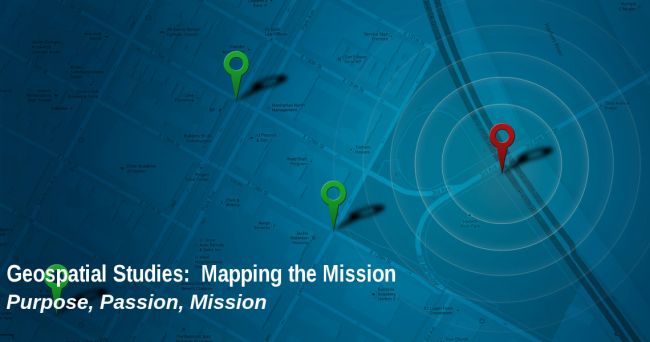DEPARTMENT OF GEOSPATIAL STUDIES
Explore Geospatial Studies
Academic Programs
Dual Enrollment Academies
Certificate Programs
Associate Certificate programs
Undergraduate Certificate programs
Graduate Certificate programs
- Applied Geospatial Analysis
- Geographic Information Systems (GIS)
- Geoinformatics & Geovisual Analytics
- Geospatial Analysis of Environmental Ecology
- Geospatial Analysis of Global Health and Disease
- Geospatial Analysis of Society and Population Groups
- Physical Geography
- Remote Sensing & Image Processing
- Human Geography
Degree Programs
Associate Degrees
Bachelor Completion Degrees
- Major in Geographic Information Systems (GIS)
- Major in Human Geography & GIS
- Major in Physical Geography & GIS
Bachelor 2+2 Degrees
Masters Degrees
Doctoral Degrees
- None at this time
Course Descriptions
Undergraduate Courses
Graduate Courses
Resources
Contact
- Still Have Questions?
- Contact Admissions
Calendar

About the Department
The Department of Geospatial Studies fosters multidisciplinary research and development in geospatial studies and promotes the efficient utilization of geographic information systems, remote sensing, global positioning systems,and spatial analysis to support global missional operations, strategies and decision-making across a wide range of missional activities in intercultural mission, missional practices, community ministries, environmental mission, global healthcare, communication and media, and theological studies.
Areas of Study
The Department of Geospatial Studies offers students a variety of courses in several areas, including:
- Geospatial Modeling & Geodatabase Design: beginning with basic GIS data structures, including vector and raster data models, students will learn about how geographic data will be represented and stored.
- Spatial Analytical Methods: includes basic methods and advanced topics that examine the locations, attributes, and relationships of features in spatial data through overlay and other analytical techniques in order to address a question or gain useful knowledge.
- Design Aspects: the design of geospatial projects, working through the geographic problem solving process, managing resources within GIS-based projects, and implementing planning and workflows.
- Digital Cartography and Visualization: issues in print and online mapmaking, principles of map design, techniques for graphic representation, and the production, use, and evaluation of maps.
- Global Positioning & Global Navigation Systems: students are introduced to GPS and GNSS technologies including current issues and perspectives
Learning Outcomes
Students who complete the Bachelor of Ecological Mission in Geospatial Studies will be able to:
- Articulate a theological foundation for geospatial studies and geomission
- Demostrate understanding of and ability to analyze spatial relationships across multiple types of data
- Demostrate understanding of, and ability to analyze and critique human and geospatial interactions
- Define and use basic geography tools and techniques
- Demonstrate ability to analyze and compare/contrast global regions across multiple research data topics
- Demonstrate ability to read, understand research literature, and engage in productive geospatial research activities
- Demonstrate professional communication skills
Students who complete the Master of Ecological Mission in Geospatial Studies will be able to:
- Articulate a theological foundation for geospatial studies and geomission.
- Demonstrate the ability to explain contemporary issues in geospatial data and geospatial technologies such as GIS, GPS, remote sensing, and geofencing in the context of current theory.
- Demonstrate the ability to define a geospatial research problem and design and execute a research program.
- Demonstrate the ability to evaluate and interpret geospatial research results in the context of current theory.
- Demonstrate the ability to communicate geospatial research results in written, graphic, and verbal form.
- Demonstrate understanding of how geospatial technologies may be applied to a variety of problems.